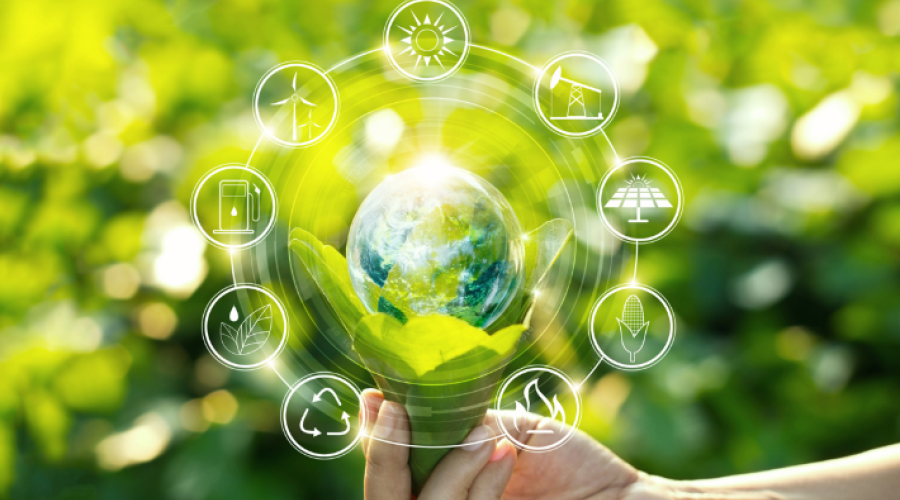
Green Energy: A Sustainable Path to Combat Climate Change and Drive Azerbaijan's Renewable Energy Future
Green energy is key to combating climate change, reducing emissions, and fostering sustainability. Azerbaijan can lead in renewables by leveraging its resources and promoting a greener future.
Types of Green Energy and Their Features
Green energy is derived from renewable energy sources, significantly reducing carbon emissions. The primary types of green energy are:
1. Solar Energy
Description:
Solar energy harnesses the sun’s radiation and converts it into heat or electricity using solar panels (photovoltaic systems) and solar thermal systems.
Advantages:
- Infinite and sustainable source.
- Reduces air pollution.
- Becoming more affordable as installation costs decrease.
Statistics:
- Global solar energy production surpassed 1 terawatt in 2022.
- Azerbaijan's solar energy potential is estimated at 23,000 MW, but its usage remains limited.
Applications:
- Lighting (streetlights, households).
- Electricity generation (industrial and domestic).
- Solar water heaters.
2. Wind Energy
Description:
Wind energy is converted into electricity through wind turbines, which transform the wind's kinetic energy into mechanical and then electrical energy.
Advantages:
- Completely clean with no harmful emissions.
- Low operational costs.
- Highly efficient over large areas.
Statistics:
- Global wind energy production reached 900 gigawatts in 2023.
- Azerbaijan’s wind energy potential is around 3,000 MW, primarily along the Caspian Sea coast and the Absheron Peninsula.
Applications:
- Electricity generation (grid-connected and standalone systems).
- Water pumps in agriculture.
3. Hydropower
Description:
Electricity is generated by utilizing flowing water or reservoirs. Water turbines convert the kinetic energy of water into electricity.
Advantages:
- A sustainable energy source.
- Provides energy storage through reservoirs.
- Has relatively minimal environmental impact.
Statistics:
- Hydropower accounts for 16% of global electricity production.
- In Azerbaijan, hydropower generates 17% of the country’s energy, with major plants in Shamkir, Mingachevir, and Yenikend.
Applications:
- Large-scale electricity generation.
- Irrigation systems in agriculture.
4. Biomass Energy
Description:
Biomass involves generating energy from agricultural, livestock, and forestry waste through natural combustion or anaerobic digestion.
Advantages:
- Reduces waste through the use of organic materials.
- Maintains natural carbon balance.
- A wide range of waste can be utilized as an energy source.
Statistics:
- Global biomass energy production reached 50 exajoules in 2023.
- While Azerbaijan has high potential, the sector is still in its early stages of development.
Applications:
- Heat and electricity production.
- Biofuel production (bioethanol and biodiesel).
5. Geothermal Energy
Description:
This energy is derived from the heat beneath the Earth’s crust. Special drilling or thermal water sources are required for its utilization.
Advantages:
- A constant and uninterrupted energy source.
- Does not emit carbon.
- Ideal for both heating and electricity production.
Statistics:
- Global geothermal energy production reached 16 gigawatts in 2023.
- In Azerbaijan, geothermal resources exist in regions like Nakhchivan and Gobustan.
Applications:
- Heating systems.
- Electricity generation.
6. Hydrogen Energy
Description:
Hydrogen energy is produced through the electrolysis of water or biomass and is mainly used in transportation and industry.
Advantages:
- A complete alternative to fossil fuels.
- Produces no harmful emissions.
- Versatile applications.
Statistics:
- The global hydrogen market value reached $155 billion in 2023.
- Although not widely used in Azerbaijan, its future potential is significant.
Applications:
- Electricity generation.
- Fuel cells (for vehicles).
Energy Perspectives in Azerbaijan
Azerbaijan's geographical location, natural resources, and environmental challenges make it suitable for the broad application of renewable energy. The country has significant potential, particularly in solar and wind energy. Currently, the "Green Energy" concept is being implemented in Karabakh and Eastern Zangazur. These projects are crucial for environmental protection and economic development.
The development of green energy will enhance Azerbaijan's energy security and contribute to global efforts against climate change.
The Role of Green Energy in Addressing Global Climate Change
Over recent decades, industrialization and urbanization have led to severe environmental pollution. The extensive use of fossil fuels has caused global warming, increased atmospheric carbon dioxide (CO₂) levels, and disrupted ecological balance. According to the IPCC (Intergovernmental Panel on Climate Change), the global average temperature has risen by 1.1°C compared to 1850-1900 levels, resulting in rising sea levels, melting glaciers, and more frequent extreme weather events.
Azerbaijan is also feeling the effects of climate change, including changes in the Caspian Sea level, reduced agricultural productivity, and declining water resources. This highlights the urgent need for renewable energy development.
Impacts of Climate Change
Increase in Carbon Emissions
Carbon emissions are primarily linked to the use of fossil fuels such as coal, oil, and natural gas. According to the International Energy Agency (IEA), carbon emissions reached 36.8 billion tons in 2023.
Situation in Azerbaijan:
In 2021, Azerbaijan recorded 34.7 million tons of carbon emissions, mainly from energy production and transportation. However, the government has committed to reducing carbon emissions by up to 40% by 2030.
Rising Sea Levels
Sea levels have risen by 15-20 cm over the past century, affecting the Caspian Sea’s coastline through erosion and ecological imbalances.
Extreme Weather Events
Global warming has led to increased floods, droughts, and other extreme weather events. In 2023, the global economic impact of these events was $250 billion. In Azerbaijan, droughts and floods have severely affected agriculture and water resources.
Green Energy and Its Development
Solar Energy
Global solar energy production surpassed 1 terawatt. Azerbaijan receives 2,400-3,200 hours of sunlight annually, making it a high-potential region with an estimated capacity of 23,000 MW.
Wind Energy
Wind energy contributes to 8% of global electricity production. The Caspian Sea coastline offers significant opportunities for Azerbaijan, with a potential capacity of 3,000 MW.
Hydropower
Hydropower accounts for 16% of global energy production, and Azerbaijan’s hydropower plants contribute 17% of the country’s energy output.
Biomass Energy
Biomass energy reduces environmental harm by utilizing agricultural waste. While Azerbaijan has potential in this area, its utilization is currently minimal.
Geothermal Energy
Geothermal resources are mainly located in Nakhchivan and Gobustan. Although not yet widely applied, future usage is possible.
Technologies and Innovations
Energy Storage Technologies
These systems enable the continuous use of solar and wind energy. The global energy storage market was valued at $120 billion in 2023.
Smart Grids
Energy management systems improve efficiency and reduce energy losses. In Azerbaijan, smart grid implementation is in its initial stages.
Hydrogen Energy
Hydrogen fuel is a cornerstone of clean energy transitions. Global investment in this sector reached $9 billion in 2023.
Azerbaijan’s Green Energy Strategy
By 2030, Azerbaijan aims to reduce carbon emissions and increase the share of renewable energy sources. Key initiatives include:
- Garadagh Solar Plant - A major project producing 500 million kWh annually.
- Caspian Wind Energy Project - Utilizing the Caspian Sea’s wind potential to boost energy production.
- Green energy projects in Karabakh and Eastern Zangazur - Expanding solar and wind energy production.
Conclusion and Recommendations
Green energy is essential for combating climate change. Countries like Azerbaijan should prioritize the use of renewable energy, invest in technological innovations, and enhance international collaborations. Recommendations:
- Invest in local green energy technologies.
- Organize public awareness campaigns on the importance of green energy.
- Collaborate with international organizations to implement large-scale projects.
Green energy is vital not only for environmental protection but also for sustainable economic development. With proper management, Azerbaijan has the potential to become a regional energy hub.






